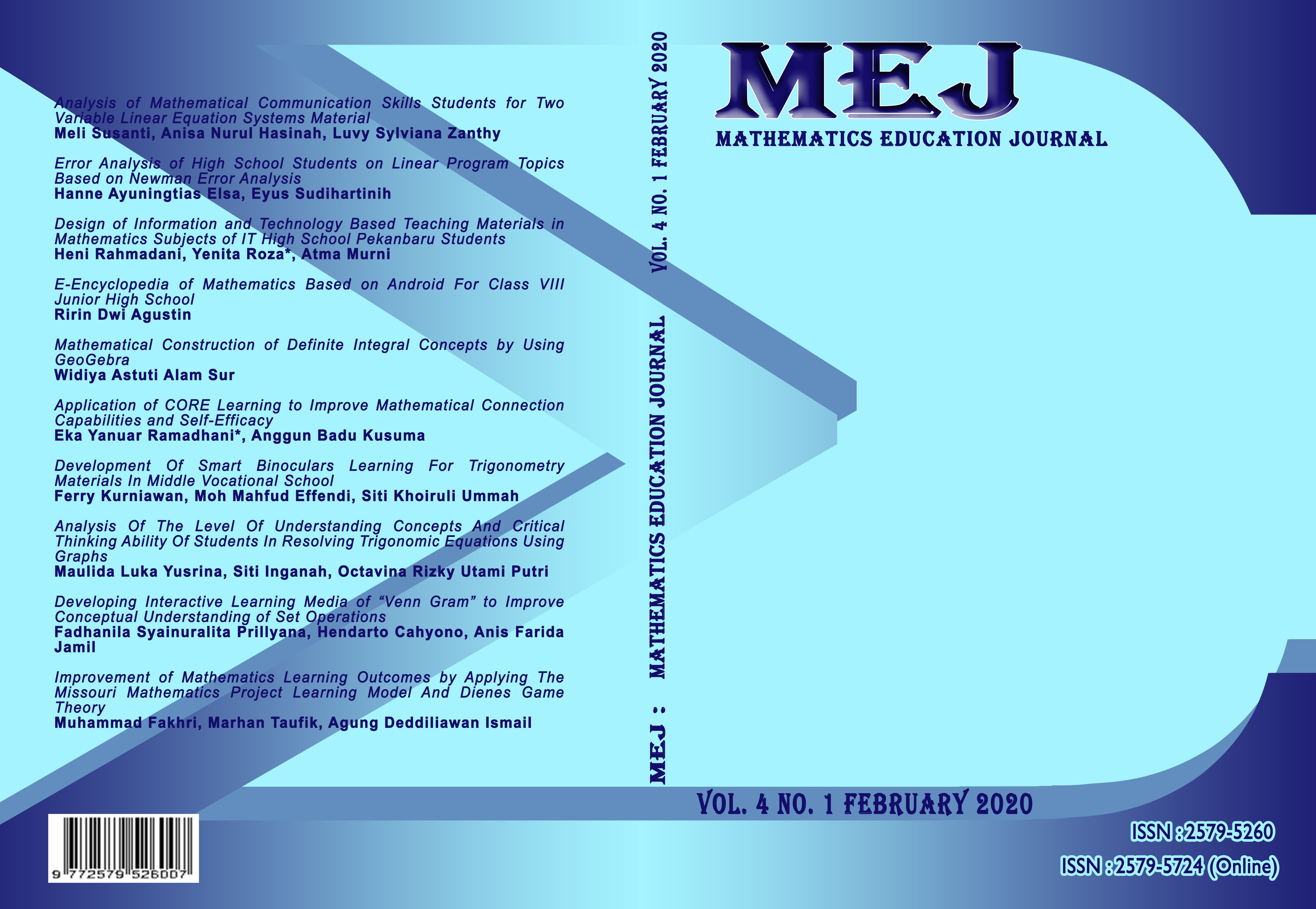Analysis of Mathematical Communication Skills Students for Two Variable Linear Equation Systems Material
DOI:
https://doi.org/10.22219/mej.v4i1.11465Keywords:
Error analysis, Communication skill, Two variable linear equation.Abstract
The communication skills of eighth grade junior high school students are catergorized as low. The purpose of this study is to analyze and describe aspects of mathematical communication skill, the research subjects consisted of 10 class students in one of the private schools located in Cimahi. The research method with data collection techniques. From the descript test regarding the two variabel linear equation system of 4 question. The results of this study indicated that students mathematical communication skill are categorized as moderate with a percentage of 42.5 % with the percentage of each item, number one 47.5 %, question number two 60 %, and question number four 32.5 %.Downloads
References
Andayani, F. (2019). Analisis kemampuan pemecahan masalah siswa smp dalam menyelesaikan soal pada materi aritmatika sosial. Jurnal Pendidikan Matematika, 3(1), 1–10.
Hajar, M. S., & Zanthy, L. S. (2008). Analisis Kesalahan Kemampuan Pemecahan Masalah Matematika Siswa MTs. On Education, 1(2), 99–104.
Martini, S., & Al, E. (2018). Pengaruh Pendekatan Realistik Terhadap Kemampuan Komunikasi dan Self Confidence Siswa SMP. Jurnal Pembelajaran Matematika Inovatif, 1(2), 149–156. https://doi.org/10.22460/jpmi.v1i3.219-228
Purwasih, R. (2015). Peningkatan Kemampuan Pemahaman Matematis Dan Self Confidence Siswa MTs Di Kota Cimahi Melalui Model Pembelajaran Inkuiri Terbimbing. Didaktik, 9(1), 16–25. Retrieved from http://e-journal.stkipsiliwangi.ac.id/index.php/didaktik/issue/view/18
putri, panca, S. (2018). Analisis Kesulitan Belajar Siswa Dalam Menyelesaikan Soal Jurnal Penyesuaian Pada Mata Pelajaran Ekonomi. Neraca, 2(2), 97–107. https://doi.org/10.1017/CBO9781107415324.004
Rahayu, T. D., Purnomo, B. H., & Sukidin, S. (2014). Analisis Tingkat Kesukaran Dan Daya Beda Pada Soal Ujian Tengah Semester Ganjil Bentuk Pilihan Ganda Mata Pelajaran Ekonomi Kelas X Di Sma Negeri 5 Jember Tahun Ajaran 2012-2013. Edukasi, 1(1), 39–43. Retrieved from https://jurnal.unej.ac.id/index.php/JEUJ/article/view/1032/829
Rahmawati, N. S., Bernard, M., & Akbar, P. (2018). Analisis Kemampuan Komunikasi Matematik Siswa Smk Pada Materi Sistem Persamaan Linier Dua Variabel (Spldv. Journal On Education, 1(2), 344–352.
Sari, A. M., Susanti, N., & Rahayu, C. (2018). Analisis kesalahan siswa dalam menyelesaikan soal cerita materi aritmatika sosial kelas VII. Jurnal Penelitian Dab Pengajaran Matematika, 4(2), 61–62.
Wijayanto, A. D., Fajriah, S. N., & Anita, I. W. (2018). Analisis Kemampuan Komunikasi Matematis Siswa Smp Pada Materi Segitiga Dan Segiempat. Cendekia : Jurnal Pendidikan Matematika, 2(1), 97–104. https://doi.org/10.31004/cendekia.v2i1.36
Yuniarti, N., Sulasmini, L., Rahmadhani, E., Rohaeti, E. E., & Fitriani, N. (2018). Hubungan Kemampuan Komunikasi Matematis Dengan Self Esteem Siswa SMP Melalui Pendekatan Contextual Teaching And Learning Pada Materi Segiempat. Jurnal Nasional Pendidikan Matematika, 2(1), 62–72.
Zanthy, L. S. (2016). Pengaruh Motivasi Belajar Ditinjau Dari Latar Belakang Pilihan Jurusan Terhadap Kemampuan Berpikir Kritis Mahasiswa Di STKIP Siliwangi Bandung. Jurnal Teori Dan Riset Matematika, 1(1).
Downloads
Published
Issue
Section
License
Authors who publish with MEJ (Mathematics Education Journal) agree to the following terms:
For all articles published in MEJ, copyright is retained by the authors. Authors give permission to the publisher to announce the work with conditions. When the manuscript is accepted for publication, the authors agree to automatic transfer of the publishing right to the publisher.
Authors retain copyright and grant the journal right of first publication with the work simultaneously licensed under a Creative Commons Attribution-ShareAlike 4.0 International License that allows others to share the work with an acknowledgment of the work's authorship and initial publication in this journal.
Authors are able to enter into separate, additional contractual arrangements for the non-exclusive distribution of the journal's published version of the work (e.g., post it to an institutional repository or publish it in a book), with an acknowledgment of its initial publication in this journal.
Authors are permitted and encouraged to post their work online (e.g., in institutional repositories or on their website) prior to and during the submission process, as it can lead to productive exchanges, as well as earlier and greater citation of published work (See The Effect of Open Access).

This work is licensed under a Creative Commons Attribution-ShareAlike 4.0 International License.










